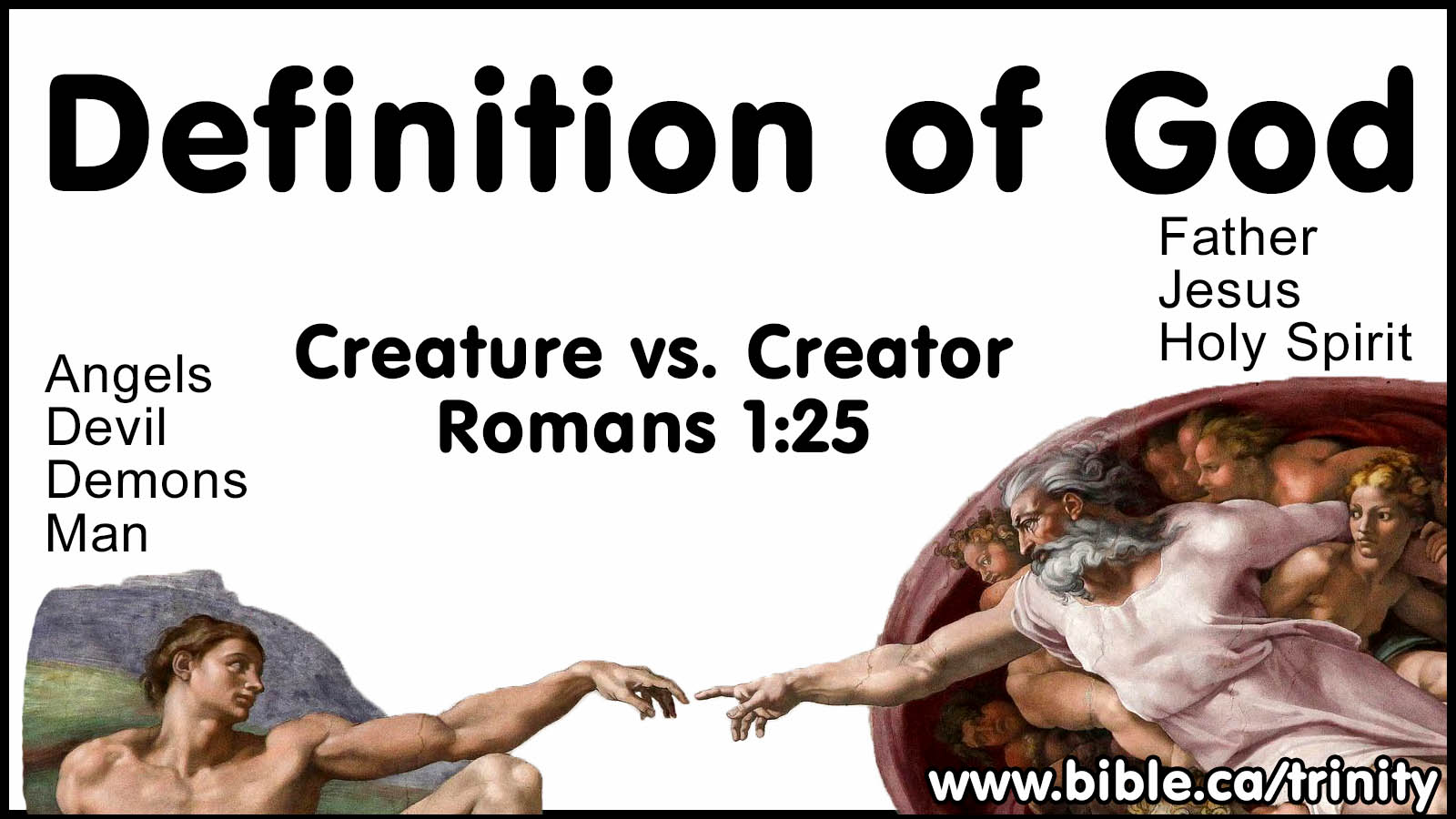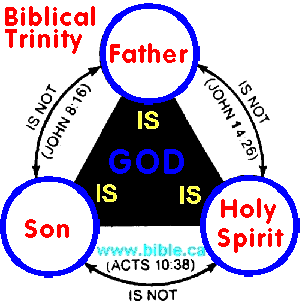Definition of God
I. Unchangeable Qualities of God: Creator, not creature
- God is not a creature and never had a beginning point, being eternal: Deut 33:27; Isa 9:6; 1 Tim 1:17; Isa 44:6
- Jesus is called the creator in Jn 1:3; Col 1:16; Heb 1:10-12
- Rom 1:25 pagans are condemned because they "worshiped and served the creature rather than the Creator". This proves Jesus is not a creature, for Jehovah's Witnesses have Jesus on both sides being a creature himself, as well as being the creator of man. Rom 1:25 refutes this contradictory false doctrine that Jesus is a creature.
- The Father, Son and Holy Spirit share the quality of eternal pre-existence with each other equally.
- No angel, devil, demon or man have ever, or will ever possess this quality. It is absolutely unique to God.
II. Qualities unique of God:
- God is everywhere (omnipresent): Mk 5:10; Jude 6; Rev 20:1-3; 1 Ki 8:27; 2 Chron 2:6; 6:18; Isa 66:1; Acts 7:49; 17:27-28; Ps 139:7-13
- God is all knowing (omniscient): Ps 139:1-6; Job 42:2; Acts 2:23; 1 Tim 1:17
- God is all powerful (omnipotent): Gen 17:1; 35:11; Rom 13:1; 1 Tim 6:15; Rev 19:6
III. Qualities that God shares with righteous angels and men after resurrection:
- God is a Spirit, without flesh and bones: Luke 24:39; John 4:24; Matthew 16:17
- God is invisible: Ex 33:20; John 1:18; 1 John 4:12; 1 Tim 6:16; Col 1:15; 1 Tim 1:17; Heb 11:27
- God is immutable (unchangeable) in his nature: Mal 3:6; But God can change his mind: Jonah 3:10; Gen 6:6
- God is a person: Rom 9:19; Isa 1:18; Rom 11:33-34; Gen 1:27; Ps 18:19; Ps 103:13; Prov 6:16; Ex 20:5; Ps 103:8; Deut 4:25; Gen 6:6; Ps 103:1
- Moral attribute of love: 1 Jn 4:8,16
- Moral attribute of Light (truth): 1 Jn 1:5; John 17:17
- Moral attribute of holiness: 1 Pet 1:16
- Moral attribute of mercy: Ps 103:8
- Moral attribute of gentleness: Ps 18:35
- Moral attribute of righteousness: Ps 129:4
- Moral attribute of goodness: Rom 2:4
- Moral attribute of perfection: Matthew 5:48
- Moral attribute of justice: Isaiah 45:21
- Moral attribute of faithfulness: 1 Corinthians 10:13
- Moral attribute of grace: Psalm 103:8
IV. Qualities that Jesus Christ possessed before, during and after incarnation:
Although Jesus Christ was fully divine before and after the incarnation, it is clear that several qualities He possessed before incarnation, were either given up, in order to become a man, or became dormant and were not used. Here are two quotes that give further details to this idea:
"When Jesus came to this earth he did not lose his power, he did not lose his prerogatives, his privileges. He did not cease to be God. He took another role, he didn't use what he had. He came to serve, not to show himself to be God. He came to do the will of the Father, and coming to earth Jesus changed roles. He took on himself the form of a servant. As a servant Jesus did every thing in this role. As a servant, Jesus would not, he did not use his innate power to give himself glory, which he surrendered. He lived in the flesh. He experienced in every way what the human spirit experiences in the body. He imposed upon himself all the limitations necessary or commensurate with this role." ... "(While) we all agree that Jesus laid aside certain rights and abilities that He has as God, so in effect He was without them, we do not agree" ... "we do not agree that He was stripped of them so that He did not possess the characteristics that make him God. To the man, we believe that Jesus retained His deity, as the word is legitimately defined." (Gene Frost, Frost-Welsh debate)
"The distinction between "nature" and "conditions" is worth pursuing. What we are saying is that his basic powers were not lost, but only the ability to exercise them. I am reminded of a picnic to which my wife and I were invited when our youngest daughter was in junior high school. Included among the activities was a softball game. There was one unusual feature of the rules that day. The young people were permitted to bat in their normal fashion, but as a means of equalizing the competition, the parents were placed under a handicap. Right-handed batters had to bat left-handed, and vice versa (switch-hitters, of course, had a great day). Now one's ability as a right-handed batter was not diminished, but it could not be exercised because of the requirement to bat from the left-handed-batter's box. Although one was still able to bat right-handed, one was not allowed to in that particular game, and thus could not bat with the usual effectiveness. In a sense, the limitation was not ultimately physical, for it resulted from a moral limitation: conscience compelled us to tell the truth about how we normally batted. This is in some ways roughly parallel to what happened in the incarnation. Jesus did not give up the qualities of God, but gave up the privilege of exercising them. Perhaps, at least for part of his life, he even gave up the consciousness that he had such capabilities and had exercised them with the Father and the Holy Spirit prior to the incarnation." (Making Sense of the Trinity - Three Crucial Questions, Millard J. Erickson, 2000AD)
- So. although Jesus was "everywhere" (omnipresent) before incarnation, he was limited to being in one place at one time, when he was a man. Obviously then, omnipresence is not an absolute condition of being God, because the fullness of deity dwelt in Jesus while he walked the earth. (Col 2:9)
- Although Jesus was "all knowing" (omniscient) before incarnation, he learned things as he grew from a baby to adulthood, when he was a man. (Lk 2:52) Obviously then, being "all knowing" is not an absolute condition of being God, because the fullness of deity dwelt in Jesus while he walked the earth. (Col 2:9)
- Although Jesus was all powerful (omnipotent) before incarnation, he fell beneath the weight of the cross on route to crucifixion. Obviously then, being "all powerful" is not an absolute condition of being God, because the fullness of deity dwelt in Jesus while he walked the earth. (Col 2:9) "How can Jesus have access to all wisdom and at the same time go through the learning process, etc. I don't know. I don't know". (Gene Frost, Frost-Welsh debate)
- Although Jesus was a "spirit" without flesh and bones, before incarnation, he changed and became flesh and bones. Obviously then, being "a spirit" is not an absolute condition of being God, because the fullness of deity dwelt in Jesus while he walked the earth. (Col 2:9)
- Although the Bible says God is immutable (unchangeable) this quality refers not to the presence, knowledge, power or ontological make up of God, but his core moral values.
V. False Dilemmas regarding the nature of Christ after incarnation while Jesus was a man:
All Arians, who say Jesus is an Angel or a creature are notorious for using false dilemmas. Some Trinitarians also use a few false dilemmas that will actually create problems in false doctrine because they define God in an incorrect way. Arians will say: "God is a spirit without flesh and bones" to prove that Jesus was not divine when he walked the earth. Some Trinitarians will say: "God cannot be tempted, and since Jesus was God, he was not tempted.". Both these are false dilemmas. The fact remains that while God normally is a spirit that cannot be tempted, the whole point of the incarnation is that God became flesh that was tempted as a man. Therefore Jesus is fully God while he walked the earth, although he was flesh and bones and was tempted. So when Jehovah's Witnesses deceptively try to prove Jesus cannot be God with the following false dilemma, "God is not a man, Jesus was a Man, Jesus cannot be God." Simply answer them, "Angels are not men, Jesus was a man, Jesus cannot be an angel."
By Steve Rudd
contact the author


